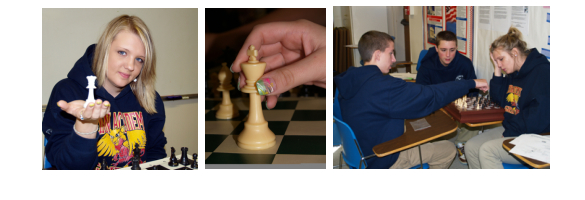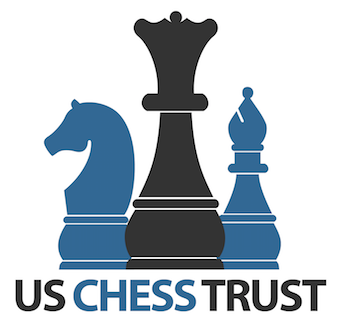Ryan Academy’s Success with Chess!

Ryan Academy students engrossed in a game of chess.
The U.S. Chess Trust donated chess equipment to the Ryan Academy. Below is a note we received from the Ryan Academy regarding their success with chess!
“”A million thanks! We have had some stunning success thanks to chess. The game has dramatically improved concentration, focus, behavior and has been the basis for our Chessays in writing classes. A series of writing prompts on ‘How chess is like life’ brought out some truly insightful works. Learning and regularly playing the game has been especially beneficial to students coping with ADD, ADHD, Dyslexia and high stress situations in their personal lives.”
Congratulations to the Ryan Academy for implementing a chess program that supports their students in a positive way! We are proud to support them with our Chess-for-Youth program and look forward to hearing from them again!
Playing chess has proven to help students enhance their creativity, improve their power of concentration, develop and expand critical thinking skills, boost memory and retention, and achieve superior academic performance.
Additionally, chess has been shown to augment problem-solving capabilities, provide cultural enrichment, advance intellectual maturity, and enhance self-esteem. We know that these are qualities that school administrators, parents, and teachers desire for their students.
The U.S. Chess Trust’s Chess-For-Youth program operates under a very simple premise chess makes kids smarter and should be an opportunity available to all students across the country. We can help you establish or continue your chess program! Click here to find out more about the Chess-for-Youth program.
To find out more about the Ryan Academy – Click Here.
We have included an excerpt from a book titled “Educational Benefits of Chess” by Dr. Robert Ferguson which sheds some light on chess in education. Feel free to download the entire book by clicking on the link at the bottom of the excerpt.
Educational Benefits of Chess by Dr. Robert Ferguson
Chapter I. The Problem
“In modest forms thinking pervades, and to a degree rules, all activities of a human being. Why, then, are we so little concerned with the study of thought processes?” –Wolfgang Kohler
Introduction
There is a pressing need, in the opinion of many educators, leaders, employers, and others, to teach young people how to think. These studies propose that critical and creative thinking can be taught using chess as the vehicle. My 1987-88 research also asserts that chess can be utilized to develop memory.
There is a very strong contention among both educators and chess aficionados that chess develops a number of valuable skills.
“Chess Makes You Smart” is the upbeat message of the U.S. Chess Federation.
Benjamin Franklin promoted a similar idea in his essay “The Morals of Chess”:
“The game of Chess is not merely an idle amusement; several very valuable qualities ofthe mind, useful in the course of human life, are to be acquired and strengthened by it, so as to become habits ready on all occasions; for life is a kind of Chess, in which we have points to gain, and competitors or adversaries to contend with, and in which thereis a vast variety of good and ill events, that are, in some degree, the effect of prudence, or the want of it. And this we may learn by playing at Chess.” (Franklin, 1786).
Franklin went on to list these valuable qualities of the mind as:
- 1st, Foresight, which looks a little into futurity, and considers the consequences that may attend an action. . . . “If I move this Piece, what will be the advantage or disadvantage of my new situation?”
- 2nd, Circumspection, which surveys the whole Chessboard, or scene of action.
- 3rd, Caution, not to make our moves too hastily. . . .
- And, lastly, we learn by Chess the habit of not being discouraged by present bad appearances in the state of our affairs; the habit of hoping for a favourable change, and that of persevering in the search of resources.
The first official world champion, Wilhelm Steinitz (1889), expressed the value of chess as follows:
“It is almost universally recognised as a healthy mental exercise, which in its effects on the intellectual faculties is akin to that of physical gymnastics on the conservation and development of bodily strength.
Moreover, the cultivation of the game seems also to exercise a direct influence on the physical condition of chessplayers and the prolongation of their lives, for most of the celebrated masters and authors on the game have reached a very old age, and have pre- served their mental powers unimpaired in some instances up to their very last moments.”
Read or Download (PDF): Educational Benefits of Chess by Dr Robert Ferguson

